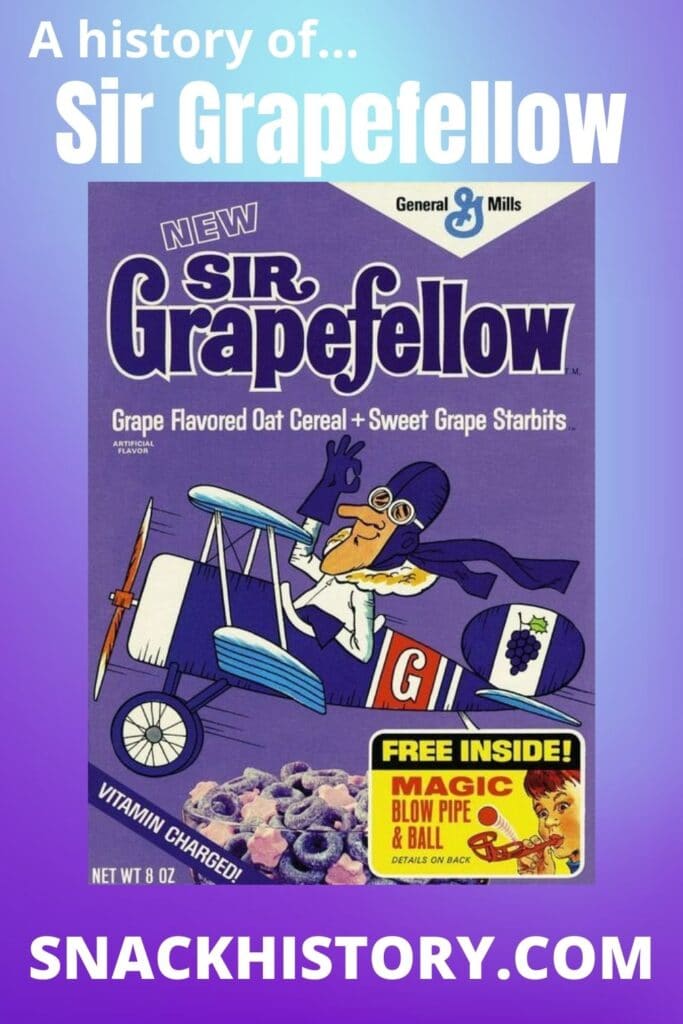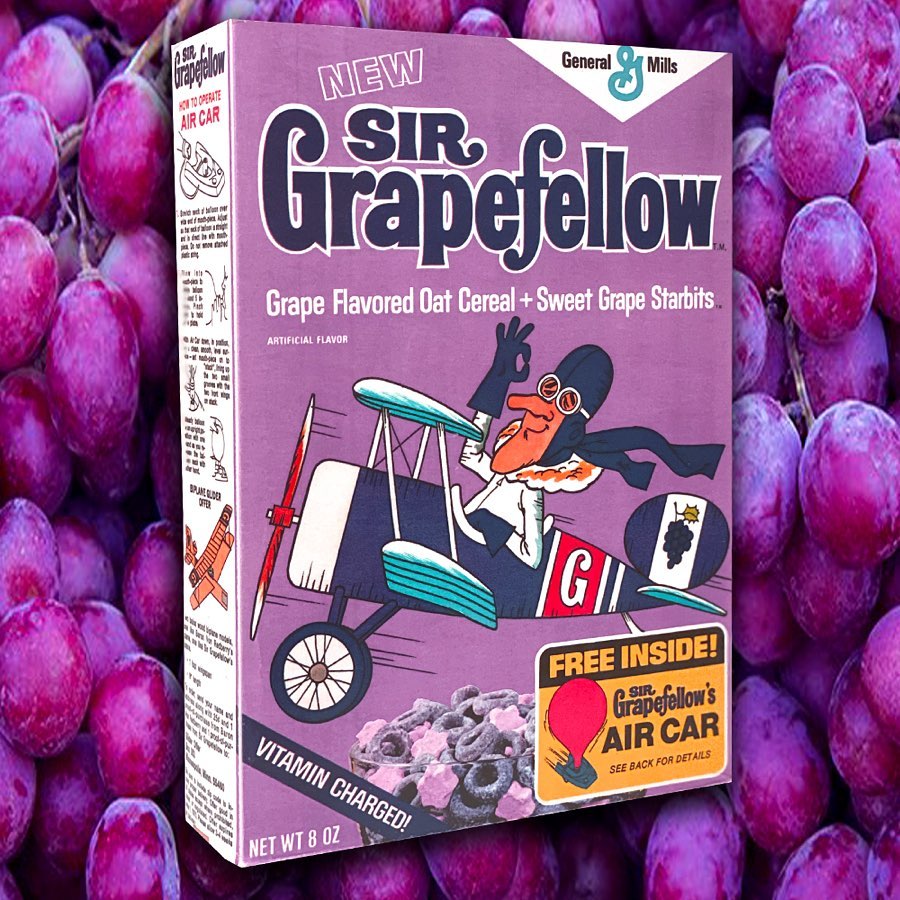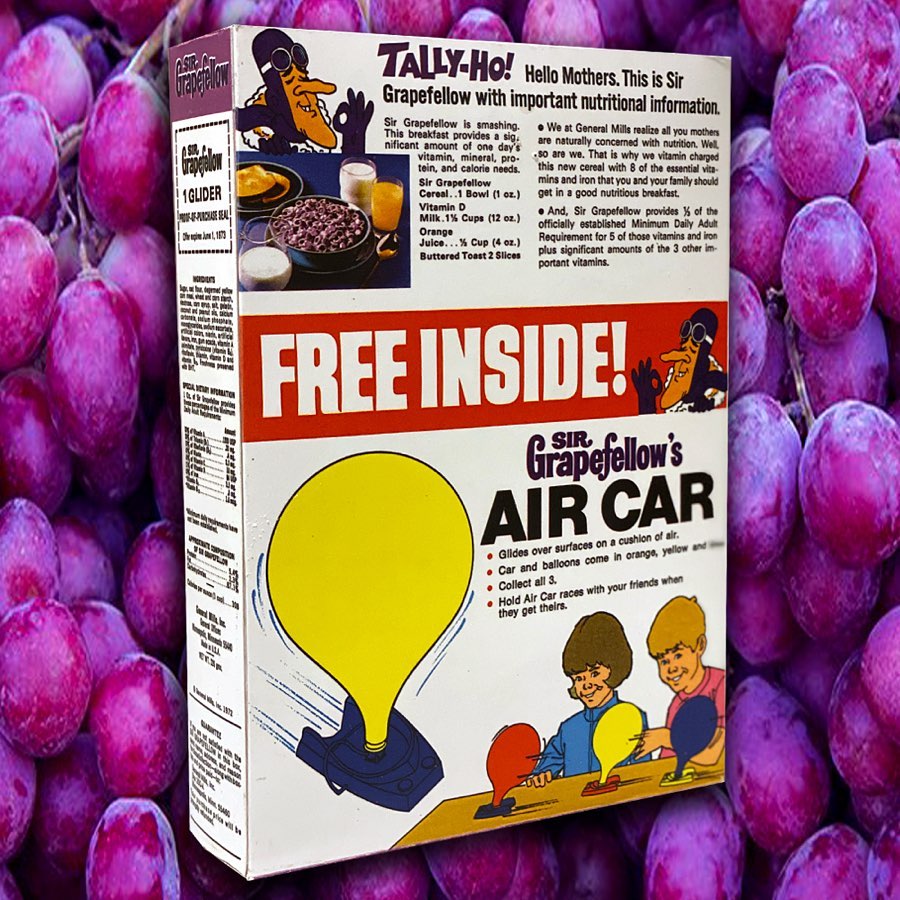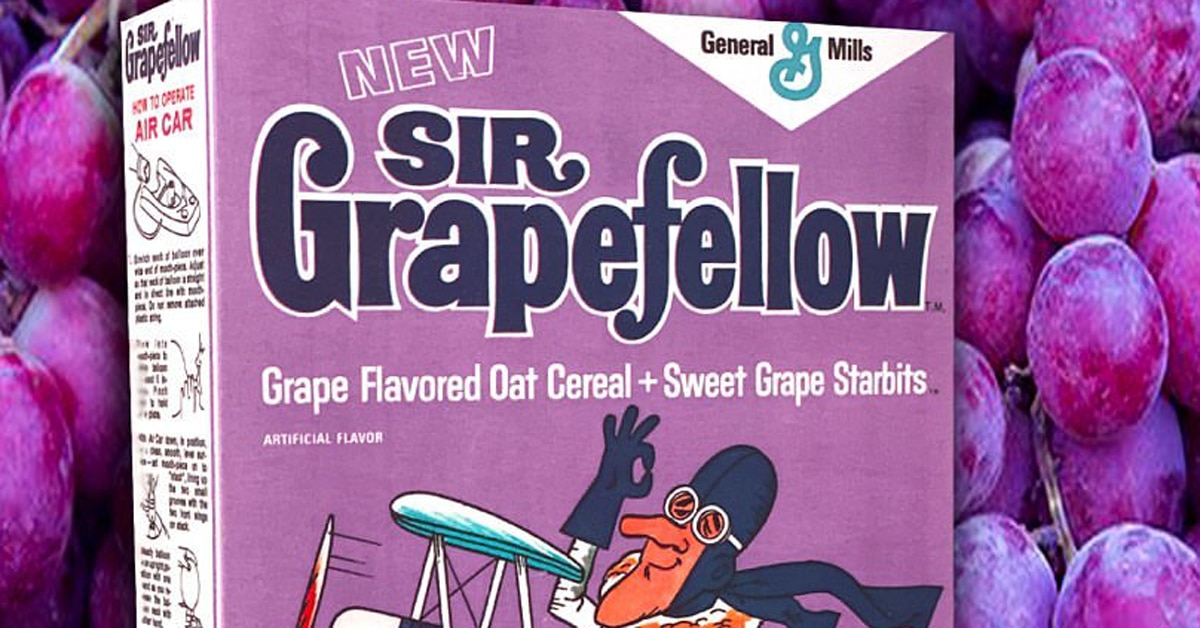Sir Grapefellow Cereal (History, Pictures & Commercials)
There are not many kinds of cereal that have been made by General Mills that did not experience long-term success. The company is famous for creating memorable and exciting cereal blends and styles that were often paired with silly and fun mascots. General Mills has sold some of the same cereals since the early 1900s with great success.
Sir Grapefellow, however, was one of their products that did not stand the test of time. This was a very unique cereal that was marketed for a short time in the 1970s. There are people who still remember this cereal fondly and talk about it with a smile on their face but there are just as many people who have never heard of it.
Please leave a review or any memories of this snack in the comments at the bottom of this page. Thank you!
If you have always wondered what cereals you might have missed out on from General Mills’ past, this is one of the ones at the top of the list. It might not have been delightful in taste, but Sir Grapefellow is quite memorable for a whole host of other reasons.

History
This cereal was first introduced by General Mills in the 1970s alongside its compatriot cereal called Baron von Redberry. The cereals were set up with the mascots as companionable rivals, much like Count Chocula and Franken Berry. Unlike these more famous mascots, however, Sir Grapefellow and Baron von Redberry were not a huge hit and did not stand the test of time.
The cereals were made in the same style as the successful Monster cereals that the brand is still selling today. The mascots would bicker politely over who was the best cereal and the theme was that of World War One-style fighter pilots. The idea was that the cereals would seem like rivals on different teams and it was hoped that the appeal of the planes would create great interest in male children especially.
Sir Grapefellow was marketed as a grape-flavored cereal with grape oats and grape “starbits”. The starbits were marshmallows that were reminiscent of the marshmallows in the monster cereal lineup. Many people who loved the cereal reported that the smell of grape when you opened the box was almost overwhelming but that the actual taste of the cereal was not as strongly linked with the grape flavor that you would expect.
Baron von Redberry was a berry-flavored cereal with all the same styling as Sir Grapefellow. The two were meant to be shown as good-natured enemies fighting for the attention of cereal lovers everywhere. The tag lines from the back of the box were definitely linked with World War One slang and lingo and meant to appeal to mothers and children alike.
Perhaps the cereal did not succeed due to the already slightly obscure nature of the mascots. Another key issue might have been that grape-flavored cereal has never taken off for this brand and the fruity-based cereals that they made in the monster lineup were also flops overall. Frute Brute and Fruity Yummy Mummy were also not successful for the brand and this was probably also due to their odd flavor profile. At one point this other cereal variety included lime-flavoring, which just seems completely out of step with breakfast foods as a whole.
It is possible that many children simply did not understand enough about the mascots of this 70s candy to connect with them. World War One was not long ago when compared to now, but even children of the 70s would have thought of this as a long-ago historical conflict that had nothing to do with them. The monster cereals were so successful because they tapped into the current craze for monster movies and monsters in popular culture. The era of the World War One flying ace was long past, despite the lasting success of Snoopy portraying the Red Baron.
Another negative impact on this cereal might also have been the increased inclusion of grape flavoring in many children’s medicines during this period. There are not many people of this age group that do not associate grape flavoring with cough syrup and other medicines of the time. There is nothing at all charming about consuming cereal that reminds you of cough medicine and this might have been the biggest reason that Sir Grapefellow did not stand the test of time.
Marketing
As mentioned above, Sir Grapefellow and Baron von Redberry were meant to be antagonists in World War One. They would verbally spar while flying their planes in commercials, and try to convince children that their flavor was the best. There was a lot of movement in these commercials and visual things that a child might latch onto, just like with the monster cereal branding that was succeeding for the company at the same time.
There were toys offered inside of the cereal boxes that were planes and cars and also action figures. Children could get larger toy planes with proof of purchase and some money at local convenience stores and other locations that would take their box tops. The surprisingly purple cereal was stated to include a significant amount of the daily requirement for children of vitamins and minerals as well.
The back of the boxes of this cereal often proclaimed, “Tally-Ho! Hello Mothers! This is Sir Grapefellow with important nutritional information. The box would then detail the minerals and vitamins that it imparted to healthy and growing kids. There were also sometimes recipes for the perfect balanced breakfast like 1 bowl of Sir Grapefellow, 1 ½ cups milk, ½ cup orange juice, and 2 slices of buttered toast.
This was definitely a cereal that was trying to rope in parents as well as kids, but the results were mixed overall. Since the cereal did not last long on the market, it is likely that neither kids nor adults connected readily with this method of marketing. Despite commercial slogans like Sir Grapefellow was the “grapest” and Baron von Redberry as the “berry goodest”, these cereals failed to make a long-term connection with anyone.
Logo

Ingredients
- Sugar
- Oat flour
- Degermed yellow cornmeal
- Wheat and corn starch
- Dextrose
- Corn syrup
- Salt
- Gelatin
- Coconut and peanut oils
- Calcium carbonate
- Sodium phosphate
The ingredients of the marshmallows are detailed more carefully on the actual boxes, but these are the basic ingredients for the original formula of the cereal. The current cereals that General Mills makes that are similar to this one have undergone many recipe changes to make them comply with current healthy eating standards for kids.
Taste Experience of Sir Grapefellow
Many people reported that the taste of the cereal was definitely grape and that this was an odd breakfast cereal to choose. The startling purple color somehow made the taste of grape make more of an impact and there were many people who stated that the color was just as big a turn-off as the actual smell that would emanate from the box upon opening it. As stated above, many children’s medicines, like Dimetapp, had adopted grape flavoring.
This connection between grape flavoring and medicine did not do this cereal any favors, but it is likely that the odd fruit flavor profile of a variety of General Mills cereals during this time was not meant to be successful. Fruity Yummy Mummy and Frute Brute in the monster cereal lineup were also unsuccessful in part due to their odd mishmash of fruit flavorings.
No one wants to enjoy lime in their breakfast cereal and strong grape flavoring was also apparently not meant to be popular as well. Kids might be willing to eat almost anything, but a grape cereal was apparently not on this list.
Will Sir Grapefellow Make a Comeback?
Unlike the monster cereal lineup, there is no indication that Sir Grapefellow and Baron von Redberry will ever see the light of day again. This was a mascot reference that was dated back in the 70s and is even more dated today. On top of this, competing cereals are much less likely to strike a chord with modern kids, and cereals are not even considered to be an essential part of a healthy breakfast as they once were.
Sugary cereals are often denied today’s kids, and all of the really odd and sweet cereals of the 70s are much less likely to fare well in today’s market. Sir Grapefellow was created in an era where sugar and carbohydrates were thought to be very healthy. Today’s cereal market must be much more health-conscious overall. Mothers and kids alike are not as attracted to sugary cereals as they once were and there is less and less of a market share for sweet cereals that are made to be sugary and taste like fruit or candy.
General Mills might have made their monster cereal lineup a success for years, but even these cereals have had to make big adjustments to meet the requirements for healthy eating that have become mainstream. Cereals that are made to resemble candy and taste like fruits and other combinations of sweet items are not likely to make a big splash in today’s cereal market.
Pictures


Commercials:
A classic ad:
Another classic:

My name is Brianna and I love writing on all topics. Candy history fascinates me and I am passionate about sharing my love of this topic with everyone else!
Please leave a review or any memories of this snack in the comments below. Thank you!
Click here for a full A-Z list of Snacks and Candy

This year 2022, these two children’s cereals, sir Grapefellow and Baron Bon Redberry will mark their 50th anniversary since their release in 1972. Since these two cereals mark their 50th anniversary, General Mills who made these two cereals in 1972 that were popular with children, since they mark their 50th anniversary in 2022, should re-make limited edition of these two cereals